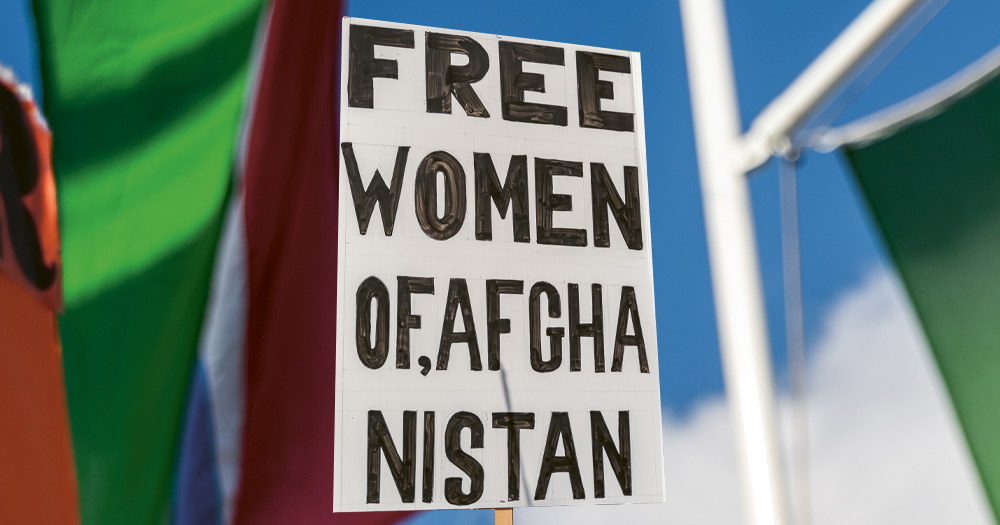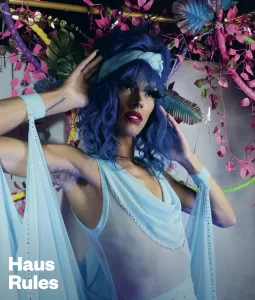Stones and petrol bombs are being hurled on the streets of Coolock and Belfast. The fires are fuelled by panic that portrays refugees and asylum seekers, especially those from Muslim countries, as dangerous. They’re far more likely, of course, to be the victims of the extremists, many of them LGBTQ+. Here, in her own words, is a courageous young woman, Zarghona from Afghanistan, as told to her friend, Izzy Kamikaze.
I was born and raised in a religious environment with lots of gender constraints from my early childhood. It’s hard even to think about it. I wasn’t happy. I was silent and couldn’t concentrate. My siblings used to call me “heroin-addicted” and “psycho”. Even neighbours called me that after a while.
Change had happened on the surface in Afghanistan, but down in the grassroots, everything was going downhill – more darkness, superstition, ignorance, poverty.
In my teens, I was thinking “What they’re doing is wrong. We can do better.” When I started asking questions, my family mocked me, even sometimes got angry and beat me. I became silent and started talking to myself. That’s why they called me “psycho” or “addicted”.
I found information on the internet in my teens. My brothers had smartphones. I used to use them, hidden, finding out about puberty and why women were considered inferior to men. Eventually, the searches helped me find LGBTQ+-related information.
I became a human rights trainer at 14. There was training at my school, run by the Human Rights Commission of Afghanistan. I was interested and answered questions about the UN and the Human Rights Declaration. They asked, “How do you know this stuff?” Those searches on my brothers’ phones had led me to women’s rights, CEDAW (Convention on the Elimination of All Forms of Discrimination against Women) and UDHR (Universal Declaration of Human Rights). I’d got interested and read more.
I didn’t tell them I learned from my brothers’ phones, I said from books. That training would be impossible now. Forbidden. Girls that age can’t even go to school.
I met Marjana on my first day in the hostel when I was 18. She was on the top bunk bed. I was under her. She was a student in another faculty, beautiful, tall, talkative, energetic, happy, kind. Everyone liked her. I told her about my feelings and she liked that. We became intimate. She liked that too!
Somehow the other girls knew. They called us lesbian in a joking way. We had baths together but pretended we were doing laundry in the bath. She was friends with everyone, laughing, funny, happy. She cried only with me. I was involved in human rights training and Marjana supported me, but she wasn’t an activist herself.
We had the best time for two years, but it changed and she was killed by her brother.
Her mom and brothers were very controlling, always suspecting she was with boys. She did get into a relationship with a man. To be honest, I asked her not to, but she did.
In her last months, she went out a lot with that man. I think someone told her brother. It was exam time. When I came back, she just wasn’t in her bed. I asked the girls. They said her mom came and took her home. Later, I found out she was dead. There was no investigation into her death.
In 2017, I was involved in setting up the first LGBTQ+ group in Afghanistan. I was 19. We had a support page on Facebook.
First we met online and in person later, after building trust. Before that, I had a fake account. That’s how I made my first LGBTQ+ friends. Later, we made an online community. Eventually, we had in-person gatherings with a trusted circle, danced, laughed, drank… We also helped LGBTQ+ people who were abused or needed medical support.
For in-person meet-ups in Kabul, we needed tickets and secret locations, sometimes my flat. A trusted circle knew the time and place and got tickets.
Through the Facebook page, I met activists from around the world, including someone from a European embassy. She got me invited to her country as an LGBTQ+ activist at risk when Afghanistan collapsed.
My relationship with my family was complicated. I was scared I’d be forced to marry. I never told them I got a flat in Kabul. I just went to Kabul for a conference and didn’t go back home.
After losing Marjana, I got that flat with two friends. We were like family – helping, listening, fighting sometimes too. After the collapse, they left for Europe. My embassy contact got me invited. I asked for my housemates too. They went but I didn’t go. I thought, “Maybe things will change.”
It didn’t change.
I was working as a gender equality specialist then – first with a local council and later with an international NGO. Some of my colleagues were Irish. After the collapse, they helped me get an Irish visa. I finally left Kabul in October 2021. I needed an Afghan man to help me. Under the Taliban, women can’t travel unchaperoned.
He wasn’t a relative so we had to prepare a marriage document. He accompanied me until I got to Ireland. In August 2020, there was a Loya Jirga (traditional public assembly) to prepare for peace negotiations.
At the Jirga, it was clear government had no vision, not even the president. I felt hopeless then. I realised even God can’t save us. It got worse every day. The Jirga was August 2020. Afghanistan collapsed in August 2021.
I always knew one day the US would abandon us, but when I saw the corruption of Afghan leaders I was disappointed. I thought after spending billions, the US would want a proper peace deal. I wrote articles about the US’ responsibilities and how to include gender equality in the peace negotiations. Unfortunately, they abandoned all the women of Afghanistan.
Trump is a Talib, but with tie not turban, and the withdrawal went ahead under Biden.
LGBTQ+ people and all vulnerable people were very scared. Many escaped to Europe, the US or Canada. The US only took people who had worked directly for them, but Canada had visas for LGBTQ+ people. I still wanted to stay in Afghanistan.
From August 2021 until I left in October, Afghanistan was depressed, fearful. No music, no colour, nobody had a smile. Kabul was Death City. Everyone was drowning in their thoughts.
The opportunity to go to Ireland arrived at the right time. My previous invitation to Europe had expired. I didn’t follow up to renew it. Canada involved a long process.
The friend I made the marriage document with was saying, “You will be killed. Let’s leave this country and you can continue your activism. If you die here everything will be finished.”
I was in limbo. I agreed and left Afghanistan.
Some LGBTQ+ friends are still in Kabul. I do what I can to help them from here.
I was lucky. When my apartment got searched, I was already gone. My father and brother had been in government jobs. They got arrested. My mom and sisters were afraid and crying, they wanted me to leave as soon as possible. They are in danger too. I often ask them to leave but my mom doesn’t want to.
Dad bought our house before I was born but they had to leave because neighbours stoned it and beat my mom while my dad was in Taliban detention. My mother, sisters and three young nieces were in the house. A neighbour’s son was shown my picture at the mosque, from an old interview on Afghan TV. They insulted my mom for having a lesbian daughter. Mom got angry and argued. Next morning they stoned our windows.
After Dad was released, I sent money and asked them to move, which they did.
With my brothers, nothing has changed. They still don’t like me. My sisters love me and support me. They make fun of me sometimes but they’d love to be like me, independent and courageous. They say this often and hold me up as an example to their kids, so they have adapted.
My dad loves me and trusts now that I don’t need a man and can take care of myself. Even for my sisters, my dad wants independence. He supports women’s independence now.
My sister Hasinat is divorced and has three little girls. They’re not safe. She is directly threatened with forced remarriage. Her three daughters are threatened with child marriage. I saved up money to get them out, but it wasn’t enough. I had to ask for help and many people with good hearts are making it happen.
Apart from these worries, life is good for me now, much better than in Afghanistan. I work with a tech company here and I’m writing and volunteering for equality and LGBTQ+ rights. I have a partner and good friends that I’m thankful for.
My hope for Afghanistan is that people learn to accept each other and don’t compare themselves with other countries but focus on building peace, happiness and prosperity. Even now I want to go back if they don’t kill me. It’s very hard to find new meaning, new goals, new ideas in a new place.
To support Zarghona and her family, share or donate to their GoFundMe here: https://www.gofundme.com/f/to-louth-with-love
I know Hasinat’s sister, a brilliant young LGBTQ+ activist from Afghanistan. Her family is in hiding. Hasinat, a young mother, is threatened with forced remarriage. Her 3 young daughters are threatened with child marriage – aka rape. Please help them. https://t.co/xbMDjYemxH
— 🏳️🌈 Izzy Kamikaze 🏳️⚧️🦕🦖 (@IzzyKamikaze) June 16, 2024
This article originally appeared in Issue 385 of GCN Magazine.
© 2024 GCN (Gay Community News). All rights reserved.
This article was published in the print edition Issue No. 385 (August 1, 2024). Click here to read it now.
Support GCN
GCN is a free, vital resource for Ireland’s LGBTQ+ community since 1988.
GCN is a trading name of National LGBT Federation CLG, a registered charity - Charity Number: 20034580.
GCN relies on the generous support of the community and allies to sustain the crucial work that we do. Producing GCN is costly, and, in an industry which has been hugely impacted by rising costs, we need your support to help sustain and grow this vital resource.
Supporting GCN for as little as €1.99 per month will help us continue our work as Ireland’s free, independent LGBTQ+ media.

